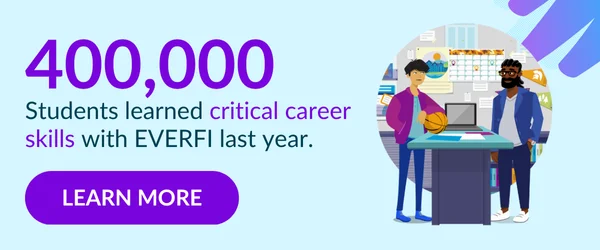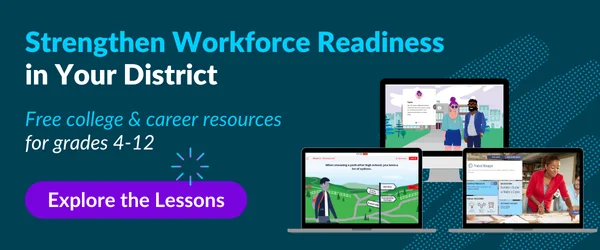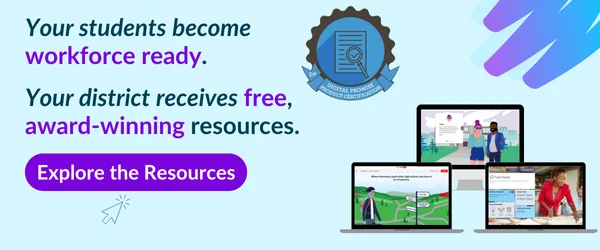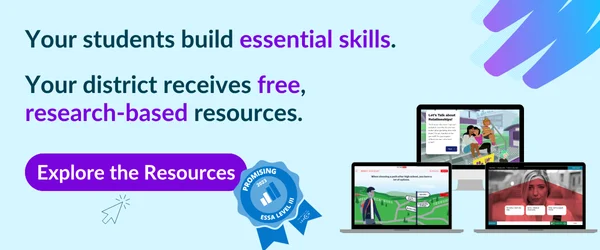- Blog
- Teaching Teens About Data Science Careers
How Teachers Can Introduce Data Science Careers to Their Students

Data science is one of the fastest-growing career fields today. The U.S. Bureau of Labor Statistics (BLS) projects that the data science career path will grow by around 36% by 2031. This field is also highly lucrative, with an average income of more than $100,000. More and more students and young adults are considering this career path.
High schoolers are facing one big hurdle when it comes to preparing for a data science career path: they are unaware of the opportunities available to them. This article will help explain how mentors and teachers can guide students to data science careers. You will learn about key benefits, career options, necessary education requirements, and instructional strategies to get students interested in learning about data science.
Main Takeaways
- Data science careers have competitive salaries and a positive job outlook.
- There are many diverse paths in data science, covering various interests.
- There are many project-based learning opportunities to inspire and teach students about data science.
- Educational pathways include formal degrees, bootcamps, and certification courses.
- Students will gain essential skills with real-world applications like programming, statistics, teamwork, problem-solving, and analytical skills.
Table of Contents
- Is Data Science a Good Career? Why Students Should Consider It
- Key Benefits of a Data Science Career
- Top Data Science Career Options
- Typical Data Science Career Path
- Educational Pathways Toward a Career in Data Science
- How Teachers Can Support Students on the Right Track
- Key Skills for Aspiring Data Scientists
- Explore Everfi’s Data Science Career Course for High School Teachers
Is Data Science a Good Career? Why Students Should Consider It
Data science has a reputation for just crunching numbers on spreadsheets — but it’s way more than that. Data science drives innovation and solves real-world problems for thousands of companies and millions of people. Students learning about data science can access many benefits. A high school computer teacher says this about exposing students to data science education:
“My students need exposure to different types of careers, so they know what is available to them. Students who don’t have this exposure cannot keep options open, and choices are taken away from them. Students make better connections in what they are learning to real world operations by understanding the importance of these careers. I would do a pre-lesson on what jobs are related to data science and how it is connected to the subjects they are learning.” — Kim H., HS Teacher, Bronx, NY
The important takeaway for students is not just about teaching them what careers are available, but showing them why it’s important. Designing lessons about teaching data science for teens needs to include the what, why, and then the how.
Key Benefits of a Data Science Career
High Demand and Job Growth
The BLS and World Economic Forum report that there will be 11.5 million job openings by 2026 in all fields related to the data science career path. Many industries rely on data science. Businesses in healthcare, finance, technology, and even video games all use the solutions found by data scientists to fine-tune their products and services. There is a strong and healthy long-term outlook for data scientists.
Many industry experts foresaw this years ago. Thomas Davenport, a former U.S. Chief Data Scientist under President Obama, said this about data science in 2012: “Data scientist is the sexiest job of the 21st century. The demand for data science skills is exploding, and organizations are scrambling to hire professionals who can turn data into insights.” — Thomas Davenport, Harvard Business Review.
Diverse Career Opportunities
There are so many options available when teaching teens about how to build a career in data science. This business teacher puts it this way: “Once the students get into (DSG), they can see that ‘Oh, wow. People really deal with data. And this is how data is being manipulated.’ For example, when you deal with urban planning, why do we want to decide to put in another housing development somewhere? Why don’t we want to do this? You can look at all the data behind it.” — Latara M. HS Business and Finance Teacher, Washington, DC.
Teens can build a career in data science following a variety of occupations. Video games, sports analytics, climate monitoring, agriculture, and hundreds of other industries are hiring data scientists. Teens can learn data science and then go apply their skills in a field they are passionate about. You can reference this article if you have students interested in data science in sports.
Great Earning Potential
Glassdoor reports that entry-level data scientists earn around $85,000 per year. Some higher-level personnel earn upwards of $150,000 or more. Students will most likely want to know potential earnings in whatever career they choose. As a mentor or teacher, this will be important to show. Financial stability is one of the most important aspects for teens and young adults.
Impactful Work
There are many examples of how data science is used to shape our world outside the computer screen. Data scientists can help a politician get elected, make farming more efficient, help source water for a remote village, predict outbreaks of diseases, find ways to optimize resources, and address many other societal issues. Money is nice, but younger people may want more out of their career. They may want to help the world. With the advancements in artificial intelligence, students can find ways to do so.
Dr. Fei-Fei Li, a leader in AI and data science, said this during a TED Talk: “Data is the lifeblood of AI, and AI has the potential to be the lifeblood of societal progress — if we use it wisely. From healthcare diagnostics to climate modeling, data science isn’t just about algorithms; it’s about solving humanity’s greatest challenges.” — Fei-Fei Li – How to Build AI That Helps Humanity
Top Data Science Career Options
The table below shows five popular roles in a data science career path. The table includes the salary range and the top needed soft skills. Below the table, you will find job descriptions of these roles.
| Role | Salary Range (Annual) | Top Soft Skills |
| Data Analyst | $65,000–110,000 | Communication, Problem-Solving, Attention to Detail |
| Data Scientist | $95,000–165,000 | Storytelling, Collaboration, Critical Thinking |
| Machine Learning Engineer | $110,000–180,000 | Creativity, Adaptability, Teamwork |
| Data Engineer | $100,000–160,000 | Project Management, Attention to Detail, Patience |
| AI Research Scientist | $120,000–200,000+ | Curiosity, Perseverance, Interdisciplinary Thinking |
Sources used: Glassdoor (2024), LinkedIn Workforce Report (2023), Indeed (2024)
Data Analyst
Data analysts interpret data to help organizations make more informed decisions. Jobs in this field create reports that show solutions or solve problems for these organizations.
Salary Range: $55,000–95,000
Skills Required:
- SQL
- Advanced spreadsheet creation
- Data visualization tools like Tableau and Power BI
Data Scientists
Data scientists work with complex data problems to provide trend reports or build models that can predict events. Many industries, from government to tech to healthcare, use data scientists.
Salary Range: $85,000–150,000
Skills Required:
- Python/R programming
- Machine learning and AI language mastery
- Statistical analysis
Machine Learning Engineer
Machine learning engineers create systems to “teach” AI models so they can perform more efficiently. The AI learns from practice, repetition, and experience. Many businesses may want their own AI tool. Things like custom chatbots are a product of machine learning. If you are an expert machine learning engineer, you could become a data engineer or an AI research scientist.
Salary Required: $95,000-160,000
Skills Needed:
- Python, TensorFlow, PyTorch
- Deep learning and neural networks
- Model deployment and optimization
Typical Data Science Career Path
The most common data science career path is as follows:
- Secondary education: Students learn about data science or computer science basics in high school.
- Post-secondary education: Students pursue degrees in data science, computer science, statistics, mathematics, or coding. Students could also earn bootcamp certificates in niche fields through online and in-person courses.
- Technical skills: Students will learn and practice their skills in computer programming models, analytics tools, and machine learning basics.
- Experience: There are many ways to gain experience by participating in internships, coding schools, school projects, and community events.
- Entry level: Companies are hiring young adults in entry-level positions like junior analysts and scientists.
- Specialization: After gaining some experience, a person could focus on interest areas like AI, big data, business, or sports analytics.
- Further career opportunities: Promotions to senior roles, helping start-ups, starting their own business, etc.
Educational Pathways Toward a Career in Data Science
In high school, students will learn about their interests and the basics. After that, students have these options:
- Degrees: This is the more traditional route. Students can earn a bachelor’s or master’s degree in computer science.
- Bootcamps: Many intense, short-term training programs that teach a specific niche data science skill.
- Online certifications: Students can find online academies and pay-per-certificate for basic or advanced courses at their own pace.
How Teachers Can Support Students on the Right Track Toward a Career in Data Science
Teachers can have a lot of fun teaching data science. This teacher in Texas says this: “(DSG) is self-paced, so they (students) can work at their own pace. And it’s relatable for them, so I can use real-life stories with it. That’s one thing I love about it, that you can tie in real-life stories to the modules and assignments. So the kids get a better understanding of ‘how does this apply to me.’ “— Denovias M., HS Computer Science Teacher, Irving, TX
If you want to make this engaging to students, here are some suggestions:
- Use a project-based learning model alongside an instructional approach. Create hands-on activities to get students actively working in that field through simulations.
- Bring in industry experts as guest speakers to share their excitement in their career paths.
- Encourage students to join clubs and competitions. This helps promote excitement, participation, and community.
- Make it relative. Show real-world world-examples. Include traditional data science industries like tech and healthcare, but also include industries like social media, sports, and video games.
For more information and resources, check out this blog post about teaching data science. We also have free data science lessons you can utilize to supplement your curriculum.
Key Skills for Aspiring Data Scientists
The following skills in this section will guide students in a direction that will help them have a successful data science career.
Programming
Students will need to learn computer coding and a language. For starters, Python and R are essential for data manipulation and machine learning.
Mathematics & Statistics
Probability and linear algebra form the backbone of data analysis. They will need these skills and knowledge to work through data problems to find solutions.
Communication
Explaining findings to non-technical audiences is crucial for impact. Data science can be extremely jargon-heavy. A good data analyst can take their technical data and present it to a group to show them how it helps them solve a problem.
Explore Everfi’s Data Science Career Course for High School Teachers
Give your students more exposure and options through Everfi’s free courses. Everfi offers a free course on data science careers. Use it to bolster your curriculum and bring real-world examples to your classroom.
Teachers can help teens unlock more opportunities by introducing students to a data science career early. There are many great opportunities to create interactive lessons and engaging projects surrounding data science career paths. As an educational leader, you can make a huge impact on the next generation of data science experts!
ields today. The U.S. Bureau of Labor Statistics (BLS) projects that the data science career path will grow by around 36% by 2031. This field is also highly lucrative, with an average income of more than $100,000. More and more students and young adults are considering this career path.
High schoolers are facing one big hurdle when it comes to preparing for a data science career path: they are unaware of the opportunities available to them. This article will help explain how mentors and teachers can guide students to data science careers. You will learn about key benefits, career options, necessary education requirements, and instructional strategies to get students interested in learning about data science.
Main Takeaways
- Data science careers have competitive salaries and a positive job outlook.
- There are many diverse paths in data science, covering various interests.
- There are many project-based learning opportunities to inspire and teach students about data science.
- Educational pathways include formal degrees, bootcamps, and certification courses.
- Students will gain essential skills with real-world applications like programming, statistics, teamwork, problem-solving, and analytical skills.
Table of Contents
- Is Data Science a Good Career? Why Students Should Consider It
- Key Benefits of a Data Science Career
- Top Data Science Career Options
- Typical Data Science Career Path
- Educational Pathways Toward a Career in Data Science
- How Teachers Can Support Students on the Right Track
- Key Skills for Aspiring Data Scientists
- Explore Everfi’s Data Science Career Course for High School Teachers
Is Data Science a Good Career? Why Students Should Consider It
Data science has a reputation for just crunching numbers on spreadsheets — but it’s way more than that. Data science drives innovation and solves real-world problems for thousands of companies and millions of people. Students learning about data science can access many benefits. A high school computer teacher says this about exposing students to data science education:
“My students need exposure to different types of careers, so they know what is available to them. Students who don’t have this exposure cannot keep options open, and choices are taken away from them. Students make better connections in what they are learning to real world operations by understanding the importance of these careers. I would do a pre-lesson on what jobs are related to data science and how it is connected to the subjects they are learning.” — Kim H., HS Teacher, Bronx, NY
The important takeaway for students is not just about teaching them what careers are available, but showing them why it’s important. Designing lessons about teaching data science for teens needs to include the what, why, and then the how.
Key Benefits of a Data Science Career
High Demand and Job Growth
The BLS and World Economic Forum report that there will be 11.5 million job openings by 2026 in all fields related to the data science career path. Many industries rely on data science. Businesses in healthcare, finance, technology, and even video games all use the solutions found by data scientists to fine-tune their products and services. There is a strong and healthy long-term outlook for data scientists.
Many industry experts foresaw this years ago. Thomas Davenport, a former U.S. Chief Data Scientist under President Obama, said this about data science in 2012: “Data scientist is the sexiest job of the 21st century. The demand for data science skills is exploding, and organizations are scrambling to hire professionals who can turn data into insights.” — Thomas Davenport, Harvard Business Review.
Diverse Career Opportunities
There are so many options available when teaching teens about how to build a career in data science. This business teacher puts it this way: “Once the students get into (DSG), they can see that ‘Oh, wow. People really deal with data. And this is how data is being manipulated.’ For example, when you deal with urban planning, why do we want to decide to put in another housing development somewhere? Why don’t we want to do this? You can look at all the data behind it.” — Latara M. HS Business and Finance Teacher, Washington, DC.
Teens can build a career in data science following a variety of occupations. Video games, sports analytics, climate monitoring, agriculture, and hundreds of other industries are hiring data scientists. Teens can learn data science and then go apply their skills in a field they are passionate about. You can reference this article if you have students interested in data science in sports.
Great Earning Potential
Glassdoor reports that entry-level data scientists earn around $85,000 per year. Some higher-level personnel earn upwards of $150,000 or more. Students will most likely want to know potential earnings in whatever career they choose. As a mentor or teacher, this will be important to show. Financial stability is one of the most important aspects for teens and young adults.
Impactful Work
There are many examples of how data science is used to shape our world outside the computer screen. Data scientists can help a politician get elected, make farming more efficient, help source water for a remote village, predict outbreaks of diseases, find ways to optimize resources, and address many other societal issues. Money is nice, but younger people may want more out of their career. They may want to help the world. With the advancements in artificial intelligence, students can find ways to do so.
Dr. Fei-Fei Li, a leader in AI and data science, said this during a TED Talk: “Data is the lifeblood of AI, and AI has the potential to be the lifeblood of societal progress — if we use it wisely. From healthcare diagnostics to climate modeling, data science isn’t just about algorithms; it’s about solving humanity’s greatest challenges.” — Fei-Fei Li – How to Build AI That Helps Humanity
Top Data Science Career Options
Top Data Science Career Options
The table below shows five popular roles in a data science career path. The table includes the salary range and the top needed soft skills. Below the table, you will find job descriptions of these roles.
| Role | Salary Range (Annual) | Top Soft Skills |
| Data Analyst | $65,000–110,000 | Communication, Problem-Solving, Attention to Detail |
| Data Scientist | $95,000–165,000 | Storytelling, Collaboration, Critical Thinking |
| Machine Learning Engineer | $110,000–180,000 | Creativity, Adaptability, Teamwork |
| Data Engineer | $100,000–160,000 | Project Management, Attention to Detail, Patience |
| AI Research Scientist | $120,000–200,000+ | Curiosity, Perseverance, Interdisciplinary Thinking |
Sources used: Glassdoor (2024), LinkedIn Workforce Report (2023), Indeed (2024)
Data Analyst
Data analysts interpret data to help organizations make more informed decisions. Jobs in this field create reports that show solutions or solve problems for these organizations.
Salary Range: $55,000–95,000
Skills Required:
- SQL
- Advanced spreadsheet creation
- Data visualization tools like Tableau and Power BI
Data Scientists
Data scientists work with complex data problems to provide trend reports or build models that can predict events. Many industries, from government to tech to healthcare, use data scientists.
Salary Range: $85,000–150,000
Skills Required:
- Python/R programming
- Machine learning and AI language mastery
- Statistical analysis
Machine Learning Engineer
Machine learning engineers create systems to “teach” AI models so they can perform more efficiently. The AI learns from practice, repetition, and experience. Many businesses may want their own AI tool. Things like custom chatbots are a product of machine learning. If you are an expert machine learning engineer, you could become a data engineer or an AI research scientist.
Salary Required: $95,000-160,000
Skills Needed:
- Python, TensorFlow, PyTorch
- Deep learning and neural networks
- Model deployment and optimization
Typical Data Science Career Path
The most common data science career path is as follows:
- Secondary education: Students learn about data science or computer science basics in high school.
- Post-secondary education: Students pursue degrees in data science, computer science, statistics, mathematics, or coding. Students could also earn bootcamp certificates in niche fields through online and in-person courses.
- Technical skills: Students will learn and practice their skills in computer programming models, analytics tools, and machine learning basics.
- Experience: There are many ways to gain experience by participating in internships, coding schools, school projects, and community events.
- Entry level: Companies are hiring young adults in entry-level positions like junior analysts and scientists.
- Specialization: After gaining some experience, a person could focus on interest areas like AI, big data, business, or sports analytics.
- Further career opportunities: Promotions to senior roles, helping start-ups, starting their own business, etc.
Educational Pathways Toward a Career in Data Science
In high school, students will learn about their interests and the basics. After that, students have these options:
- Degrees: This is the more traditional route. Students can earn a bachelor’s or master’s degree in computer science.
- Bootcamps: Many intense, short-term training programs that teach a specific niche data science skill.
- Online certifications: Students can find online academies and pay-per-certificate for basic or advanced courses at their own pace.
How Teachers Can Support Students on the Right Track Toward a Career in Data Science
Teachers can have a lot of fun teaching data science. This teacher in Texas says this: “(DSG) is self-paced, so they (students) can work at their own pace. And it’s relatable for them, so I can use real-life stories with it. That’s one thing I love about it, that you can tie in real-life stories to the modules and assignments. So the kids get a better understanding of ‘how does this apply to me.’ “— Denovias M., HS Computer Science Teacher, Irving, TX
If you want to make this engaging to students, here are some suggestions:
- Use a project-based learning model alongside an instructional approach. Create hands-on activities to get students actively working in that field through simulations.
- Bring in industry experts as guest speakers to share their excitement in their career paths.
- Encourage students to join clubs and competitions. This helps promote excitement, participation, and community.
- Make it relative. Show real-world world-examples. Include traditional data science industries like tech and healthcare, but also include industries like social media, sports, and video games.
For more information and resources, check out this blog post about teaching data science. We also have free data science lessons you can utilize to supplement your curriculum.
Key Skills for Aspiring Data Scientists
The following skills in this section will guide students in a direction that will help them have a successful data science career.
Programming
Students will need to learn computer coding and a language. For starters, Python and R are essential for data manipulation and machine learning.
Mathematics & Statistics
Probability and linear algebra form the backbone of data analysis. They will need these skills and knowledge to work through data problems to find solutions.
Communication
Explaining findings to non-technical audiences is crucial for impact. Data science can be extremely jargon-heavy. A good data analyst can take their technical data and present it to a group to show them how it helps them solve a problem.
Explore Everfi’s Data Science Career Course for High School Teachers
Give your students more exposure and options through Everfi’s free courses. Everfi offers a free course on data science careers. Use it to bolster your curriculum and bring real-world examples to your classroom.
Teachers can help teens unlock more opportunities by introducing students to a data science career early. There are many great opportunities to create interactive lessons and engaging projects surrounding data science career paths. As an educational leader, you can make a huge impact on the next generation of data science experts!

Jack Woerner
personal finance educator and writer with a background in high school economics and government
Jack Woerner is a personal finance educator and writer with a background in high school economics and government. After six years in the classroom, he shifted his focus to financial literacy, building curriculum, coaching individuals and families, and consulting with small businesses. Since 2021, he has worked as a freelance writer, creating financial content for educational companies, nonprofits, and businesses.
Free for K-12 Educators
Thanks to partners, we provide our digital platform, training, and support at no cost.
See why 45k+ teachers were active on Everfi digital resources last school year.




